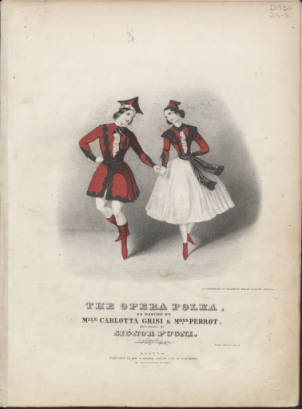Annotation:Opera Polka: Difference between revisions
m (Text replacement - "garamond, serif" to "sans-serif") |
No edit summary |
||
| Line 1: | Line 1: | ||
---------- | |||
---- | {{TuneAnnotation | ||
|f_tune_annotation_title= https://tunearch.org/wiki/Annotation:Opera_Polka > | |||
'''OPERA POLKA.''' English, Scottish; Polka. England; Dorset, Yorkshire. D Major ('A' and 'C' parts) & A Major ('B' part) {Trim}: C Major ('A' and 'C' parts) & G Major ('B' part) {Callaghan, Kerr, Merryweather & Seattle}. Standard tuning (fiddle). "AABBCC(Trio)AABB. | |f_annotation='''OPERA POLKA.''' English, Scottish; Polka. England; Dorset, Yorkshire. D Major ('A' and 'C' parts) & A Major ('B' part) {Trim}: C Major ('A' and 'C' parts) & G Major ('B' part) {Callaghan, Kerr, Merryweather & Seattle}. Standard tuning (fiddle). "AABBCC(Trio)AABB. | ||
[[File:operapolka.jpg| | [[File:operapolka.jpg|400px|thumb|left|Sheet music, c. 1848, "as danced by Mlle. Carlotta Grisi & Mons. Perrot. The music was arranged by Cesare Pugni (1802-1870)]]. "Opera Polka" appeared in a ballet '''La Esmeralda''' in 3 acts, 5 scenes, inspired by Victor Hugo's '''Notre Dame de Paris'''. It was originally choreographed by Jules Perrot, with music by Cesare Pugni, and was danced in 1844 at the Ballet of Her Majesty's Theatre by Mlle. Carlotta Grisi (1819-1899) and Monsieur Perrot. (See also note for "[[Annotation:Esmeralda Polka (La)]]"). | ||
<br> | <br> | ||
<br> | <br> | ||
The melody was entered into several mid-19th century English musicians' manuscript copybooks, including those of Lawrence Leadley (Yorkshire), the Hardy Family (Dorset), and Michael Turner (Sussex). "[[Original Polka (The)]]" and "Opera Polka" are on the page next to each other in '''Hamilton's Universal Tune Book''' and both are contained in the Hardy family manuscripts, suggesting the Hardys used that volume as their source. | The melody was entered into several mid-19th century English musicians' manuscript copybooks, including those of Lawrence Leadley (Yorkshire), the Hardy Family (Dorset), and Michael Turner (Sussex). "[[Original Polka (The)]]" and "Opera Polka" are on the page next to each other in '''Hamilton's Universal Tune Book''' and both are contained in the Hardy family manuscripts, suggesting the Hardys used that volume as their source. | ||
|f_source_for_notated_version=a MS collection by fiddler Lawrence Leadley, 1827-1897 (Helperby, Yorkshire) [Merryweather & Seattle]; the Thomas Hardy family manuscripts (Dorset, early 19th century) [Trim]. | |||
|f_printed_sources=Callaghan ('''Hardcore English'''), 2007; p. 68. Kerr ('''Merry Melodies, vol. 3'''), 1880's; No. 437, p. 50. Laybourn ('''Köhler's Violin Repository Book 3'''), 1885; p. 264. Manson ('''Hamilton's Universal Tune Book vol. 2'''), 1846; p. 145. Merryweather & Seattle ('''The Fiddler of Helperby'''), 1994; No. 96, p. 54. Trim ('''The Musical Heritage of Thomas Hardy'''), 1990; No. 54. | |||
|f_recorded_sources= | |||
|f_see_also_listing= | |||
}} | |||
Revision as of 03:02, 23 December 2022
X:1 T:Opera Polka M:2/4 L:1/8 R:Polka B:Manson - Hamilton's Universal Tune-Book (1846, p. 145) Z:AK/Fiddler's Companion K:D A|Ad {e}d/c/d|eA {B}A/^G/A|eAgA|ba a/g/f| Ad {e}d/c/d|eA {B}A/^G/A|eAgA|f/A/f/e/ d|| e/d/|c{^d}e {^g}ac'|c'b/a/ ^gf|fe {f}e/^d/e|fe {f}e/^d/e| c{^d}e {^g}ac'|c'b/a/ ^gf|f/e/^d/e/ f/e/c'/b/|a/e/c'/b/ az|| c'A c'b|ba a/g/f|aA ag|gf f/e/d| c'A c'b|ba a/g/f|ec'/b/ a/g/B/c/|dfd!D.C.!||
OPERA POLKA. English, Scottish; Polka. England; Dorset, Yorkshire. D Major ('A' and 'C' parts) & A Major ('B' part) {Trim}: C Major ('A' and 'C' parts) & G Major ('B' part) {Callaghan, Kerr, Merryweather & Seattle}. Standard tuning (fiddle). "AABBCC(Trio)AABB.

The melody was entered into several mid-19th century English musicians' manuscript copybooks, including those of Lawrence Leadley (Yorkshire), the Hardy Family (Dorset), and Michael Turner (Sussex). "Original Polka (The)" and "Opera Polka" are on the page next to each other in Hamilton's Universal Tune Book and both are contained in the Hardy family manuscripts, suggesting the Hardys used that volume as their source.

